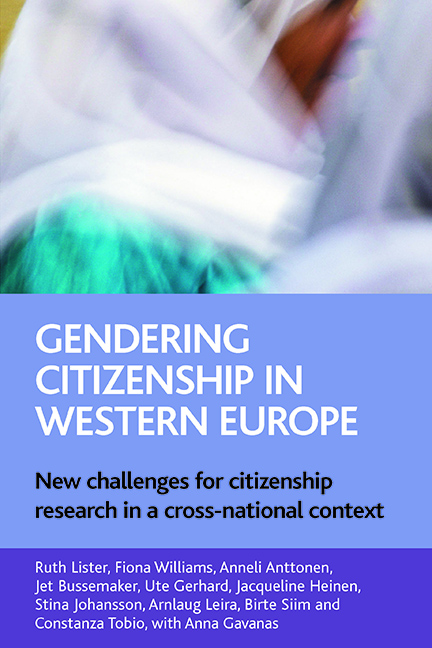 Gendering Citizenship in Western Europe
Gendering Citizenship in Western Europe two - Vocabularies of citizenship since the 1970s
Published online by Cambridge University Press: 15 September 2022
Summary
Introduction
In this chapter, we describe and analyse the range of actors involved in contemporary citizenship debates. These actors include left-wing and right-wing politicians, feminist movements, trade unions and social movements more generally. They may adhere to more dominant and powerful discourses on citizenship or struggle with alternative formulations, attacking mainstream or defending former interpretations. For all these reasons, it is not clear a priori whether citizenship is a liberating or a disciplinary concept; in fact, as stated in the Introduction, it can be both, depending on who is using the concept, in what context, and with reference to which kinds of vocabulary. From a gender perspective, such a contextualised analysis is especially important, since binaries such as public/private, dependence/independence, needs/rights, individual/community, may also be highly gendered, as well as context driven.
We focus here on those contextual issues concerning citizenship that have emerged within the European welfare states since the 1970s. We will start with asking why citizenship has become such a key concept. Then we will describe various contemporary vocabularies and feminist critiques of citizenship. In the next section, we examine some striking citizenship issues and debates in contemporary welfare states. Finally, we analyse the consequences of international developments for these vocabularies of citizenship, with a special focus on both European citizenship, and the framing of citizenship in former communist countries.
Social and political developments and the rise of the concept of citizenship
Within recent decades, citizenship has become an influential concept used in various spheres. Among academics it is used as a central concept to describe and explain developments within social and political transformation processes. In politics it is used to reformulate both the relations between citizens and the state, and relations among citizens. Within social movements and activist groups, it refers to questions of inequality, social cohesion and community life. In international organisations, such as the European Union (EU), the concept of citizenship appears to name and frame a shift in the position of the nation state and its citizens.
The main reason behind the popularity of the term ‘citizenship’ seems to be that so many contemporary issues and problems can be related to it. New questions have arisen as to the distribution of citizenship rights as a result of demographic developments, changing family and gender relations and welfare state reform.
- Type
- Chapter
- Information
- Gendering Citizenship in Western EuropeNew Challenges for Citizenship Research in a Cross-National Context, pp. 47 - 74Publisher: Bristol University PressPrint publication year: 2007


